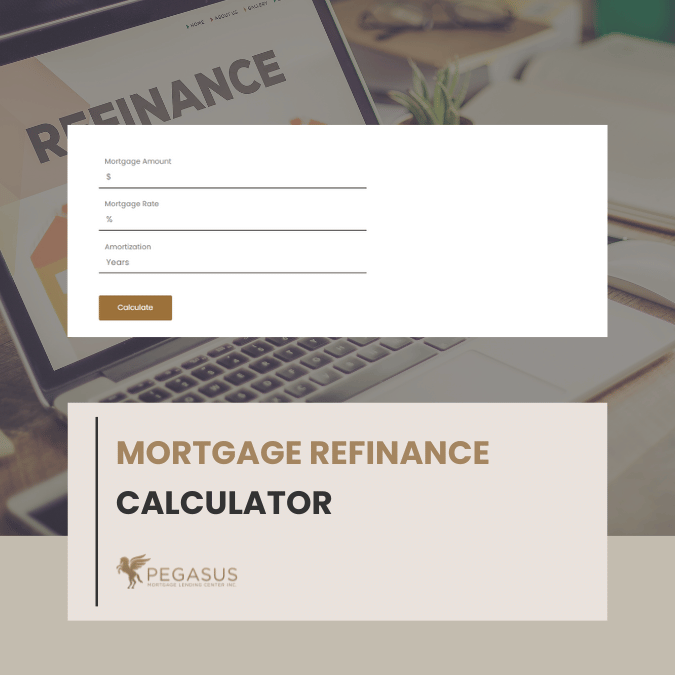Mortgage refinance calculator

Easily Calculate Your New Mortgage Payment After Refinancing
Refinancing your mortgage can help you lower your interest rate, consolidate debt, or access home equity. Our Mortgage Refinance Calculator helps you estimate your new mortgage payment, total refinancing costs, and savings potential based on your financial situation.
Prepayment Penalty
$0
Monthly Payment
$0
Key Features of Our Mortgage Refinance Calculator:
- Accurate Refinancing Calculations: Get a clear breakdown of your new mortgage payments, interest savings, and total refinancing costs.
- Equity and Cash-Out Analysis: Determine how much equity you can access through a refinance.
- Prepayment Penalty Estimates: Calculate potential penalties for breaking your current mortgage early.
- Break-Even Analysis: See how long it will take to recover the costs of refinancing.
How to Use the Mortgage Refinance Calculator
- Enter Your Home’s Current Value: Use your estimated or appraised home value.
- Input Your Existing Mortgage Balance: The amount you still owe on your current mortgage.
- Enter Your Desired New Loan Amount: If you’re refinancing for cash-out, enter the additional amount you’d like to borrow.
- Select Your New Interest Rate: Choose an expected refinance rate to see how it impacts your payments.
- Choose an Amortization Period: Select the loan term over which you’ll repay your new mortgage.
- Calculate: Instantly see your new monthly payment, estimated total costs, and potential savings.
Understanding Mortgage Refinancing in Canada
What is Mortgage Refinancing?
Refinancing replaces your existing mortgage with a new loan, often at a lower interest rate or with better terms. Homeowners in Canada refinance for several reasons:
- Lowering monthly payments by securing a lower interest rate.
- Accessing home equity for renovations, investments, or large expenses.
- Consolidating high-interest debt into a lower-cost mortgage.
- Switching from a variable to a fixed-rate mortgage for stability.
How to Calculate a Refinance Mortgage Payment
If you’re wondering how to calculate a refinance mortgage payment, the formula is:
Where:
- M = Monthly mortgage payment
- P = Loan amount (new refinanced amount)
- r = Monthly interest rate (Annual Rate / 12)
- n = Total number of payments (Years × 12)
For example, if you refinance a $400,000 loan at 4.5% interest for 25 years:
- New Monthly Payment: $2,220.93
Use our refinance mortgage payment calculator to get exact figures.
Mortgage Refinance Calculator Canada – Loan-to-Value (LTV) Considerations
What is Loan-to-Value (LTV)?
LTV measures the ratio of your mortgage to your home’s value:
Most lenders allow refinancing up to 80% LTV, meaning you must retain at least 20% equity in your home.
For example, if your home is valued at $600,000, your maximum refinance amount is $480,000.
Understanding Prepayment Penalties
If you’re refinancing before your current mortgage term ends, you may face penalties:
- Fixed-Rate Mortgages: Interest Rate Differential (IRD) or 3 months’ interest.
- Variable-Rate Mortgages: Typically 3 months’ interest penalty.
Use our refinance mortgage calculator to estimate these costs.
Break-Even Analysis: Should You Refinance?
One way to determine if refinancing is beneficial is by calculating how long it takes to recoup refinancing costs. The formula is:
For example, if refinancing costs $6,000 and your monthly savings are $200, your break-even point is 30 months (2.5 years).
Alternatives to Mortgage Refinancing
- Home Equity Line of Credit (HELOC): Access funds while keeping your existing mortgage.
- Second Mortgage: Take out another loan while maintaining your current mortgage.
- Blended Rate Mortgage: Combine old and new rates instead of breaking your current mortgage.
FAQs on mortgage payment calculator
How to calculate new mortgage payment after refinance?
Use our Mortgage Refinance Calculator to see your new monthly payment, loan amount, and interest savings.
Should I refinance my mortgage calculator?
Yes, our calculator helps determine if refinancing is financially beneficial based on savings and costs.
What costs are involved in mortgage refinancing?
Typical costs include:
- Prepayment penalties (if applicable)
- Legal fees ($1,000 – $2,500)
- Appraisal fees ($300 – $500)
- Lender fees (varies by institution)
How much equity can I access through refinancing?
Lenders typically allow refinancing up to 80% of your home’s value, minus your existing mortgage balance.
Is refinancing a good idea if interest rates are rising?
Refinancing makes sense if:
- You’re switching from variable to fixed to lock in a stable rate.
- You’re consolidating high-interest debt into a lower mortgage rate.
Make an Informed Refinancing Decision
Refinancing your mortgage can be a smart financial move if done strategically. Use our Mortgage Refinance Calculator to estimate costs, compare savings, and determine if refinancing is right for you.
Get Personalized Refinancing Advice with Pegasus Mortgage Lending
Maximize your savings and make refinancing stress-free with expert guidance from Pegasus Mortgage Lending. Use our Mortgage Refinance Calculator today to explore your options.

